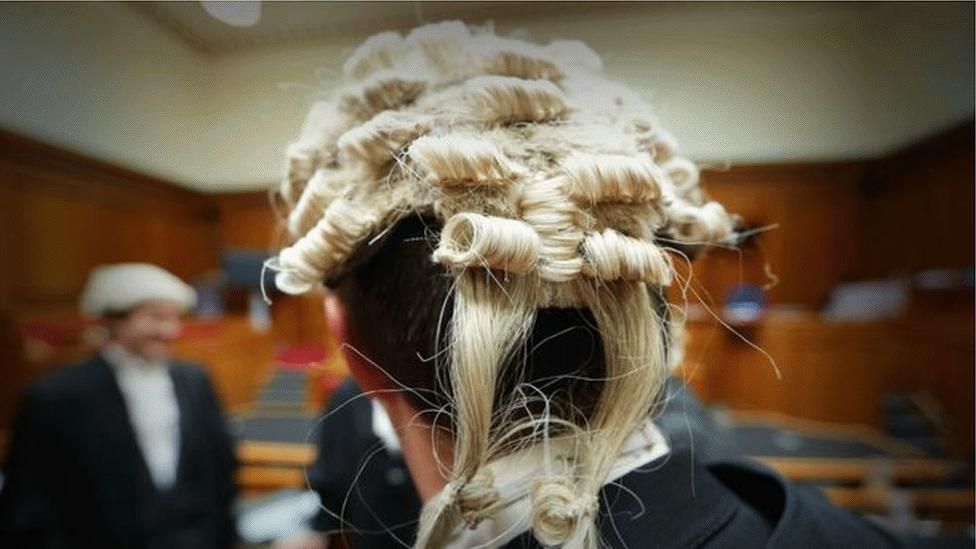MSPs split over plans for rape trials without juries
- Published

Some legal professionals oppose the scrapping of the not proven verdict
An influential committee of MSPs has backed the abolition of Scotland's not proven verdict but is split over plans to hold rape trials without juries.
Holyrood's criminal justice committee has been scrutinising wide ranging reforms to the legal system proposed by the Scottish government.
The MSPs' support for abolishing the centuries-old not proven verdict was expected.
But they were divided on other measures in the bill.
Scotland's justice secretary has acknowledged the legislation will have to be amended.
The committee convenor Audrey Nicoll MSP said they agreed with the bill's general principles on the basis that it is designed to improve the system for victims and witnesses.
But the committee believes further evidence, data and scrutiny is required.
And some of its members fear such a radical bill could have unintended consequences.
On not proven, Ms Nicoll said: "The lack of understanding or clarity on what this verdict means and the devastating impact it can have on victims, means the time has come for it to be abolished."
Defence lawyers have long argued that the demise of not proven would remove a valuable safeguard against miscarriages of justice.
With that in mind, the government has proposed changes to the jury system and the rules on majority verdicts.
At present, 15 people sit on a Scottish jury with a simple of majority of 8 required for a conviction.
The bill proposes a smaller jury of 12 with a two thirds majority required for a guilty verdict.
Scotland's prosecution service told the committee that could result in less people being found guilty and the MSPs haven't been persuaded it should go ahead.
The committee said it has not heard "compelling evidence" to support those changes.

The most contentious proposal in the Victims, Witnesses and Justice Reform (Scotland) Bill, external is a time-limited pilot of judges deciding the verdicts in rape or attempted rape trials.
Supporters believe the move could improve the low conviction rate but opponents say it would be experimenting with people's lives.
The committee's four SNP members support the pilot, subject to a number of safeguards.
Two Conservative MSPs on the committee said it represented a fundamental departure in Scots law and should not go ahead.
The two Labour members are against the proposal as it stands. They said if it does happen, a panel of three judges should be considered.
Justice Secretary Angela Constance welcomed the committee's support for the abolition of not proven and said the government would listen to views on the rest of the bill as it makes its way through parliament.
She added: "Inevitably there will be amendments and changes to this very large piece of legislation.
"But we have consensus that this bill has the potential to change the experiences of victims and witnesses, particularly in cases involving sexual offences."
Juryless trials 'reckless'
Rape Crisis Scotland chief executive Sandy Brindley supports the pilot of judge only rape trials, although she suggested that European models, such as a panel of judges, and lay assessors should be considered.
The justice secretary has been carrying out fact-finding visits to European countries where such systems are in place.
Ms Brindley welcomed the committee's opposition to changes to the jury system.
She said: "I'm so relieved to see that. If that remains in the bill, the overall impact will be fewer rape convictions."
The Scottish Solicitors Bar Association said 97% of defence lawyers would boycott the pilot if it goes ahead.
Vice-president Simon Brown said: "It's all very well to portray this as a pilot scheme but these will be real people, these will be real convictions."
He said if not proven goes, and the jury system remains unchanged, there could be more miscarriages of justice.
Scottish Conservative justice spokesman Russell Findlay said there was "no credible evidence" to support rape trials without juries.
He added: "Many rape victims told parliament that they preferred to have their cases heard by a jury rather than a single judge. Juryless trials would not be radical but reckless.
"The government needs to look at the evidence and think again."
Sexual offences courts
The committee was also divided over the bill's proposal to establish a new standalone sexual offences court to deal with serious sexual cases.
Like the proposal for a pilot of judge only rape trials, it was a key recommendation from a review group led by Scotland's second most senior judge, the Lord Justice Clerk, Lady Dorrian.
The four SNP MSPs backed the move, saying it could deliver improvements which would not be possible in the existing system.
The four Conservative and Labour members of the committee said change could be brought about through the creation of specialist divisions within the high court and sheriff court.